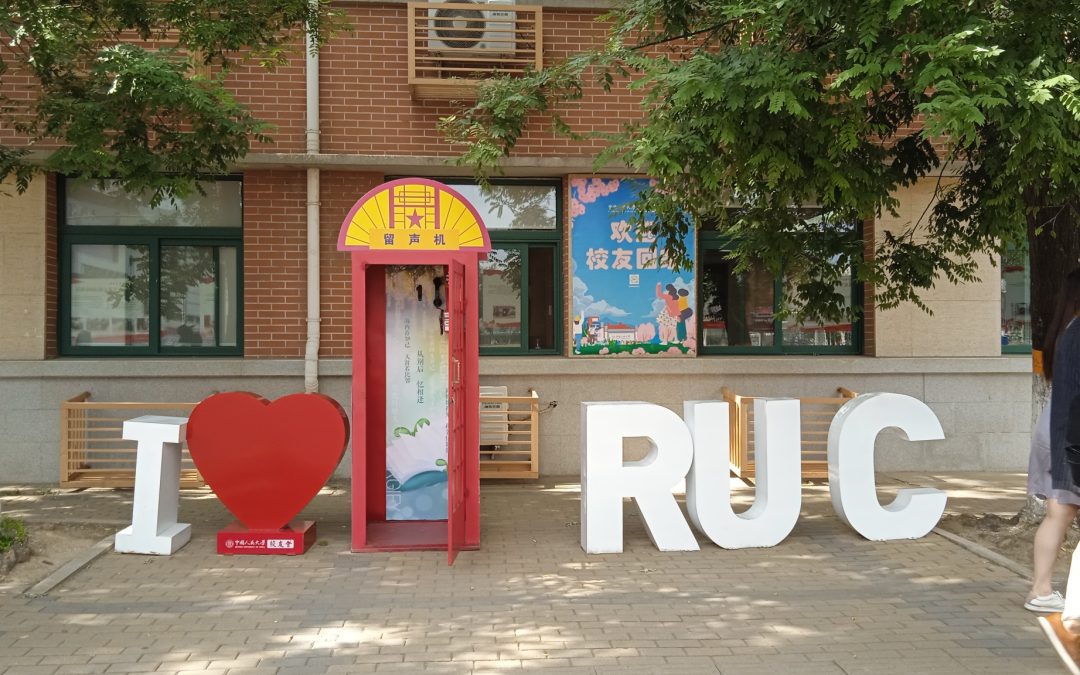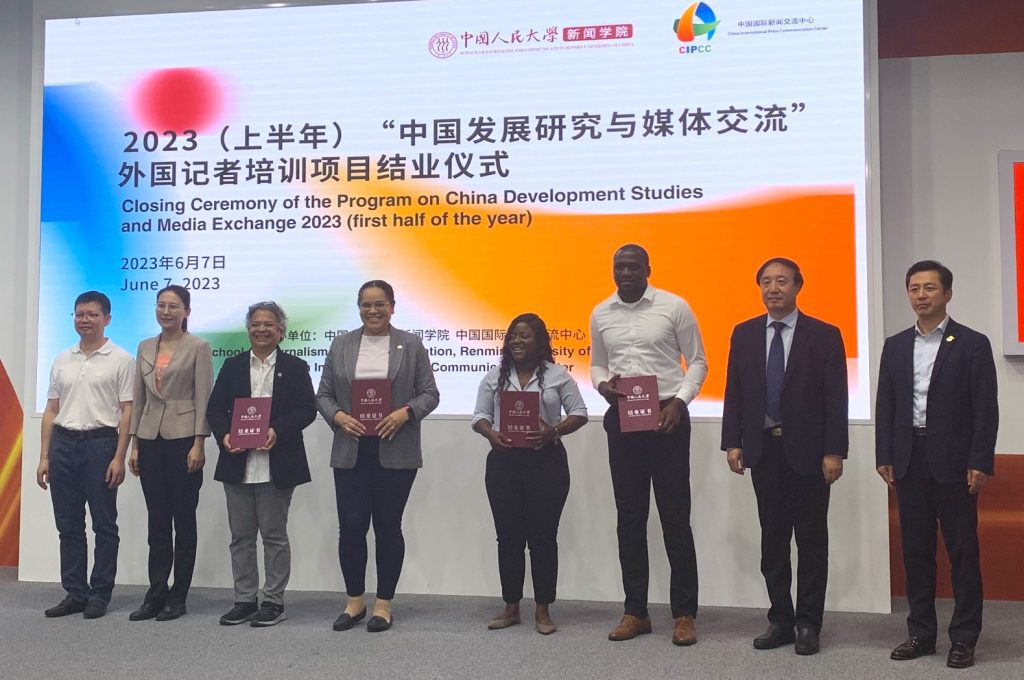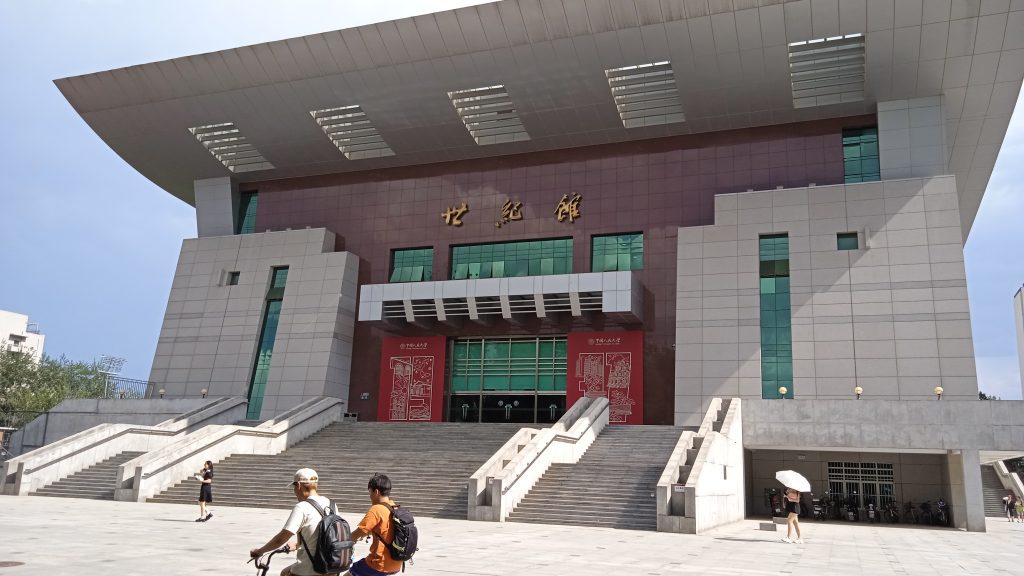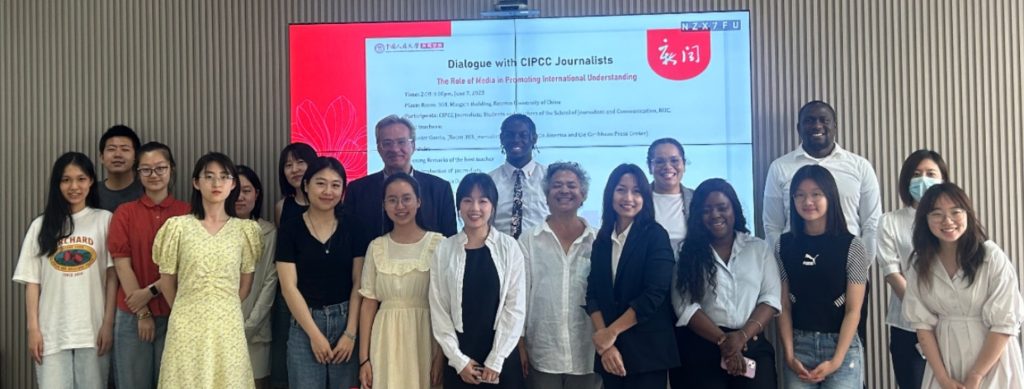Last Wednesday, 7 June, the CIPCC groups spent the day at Renmin University of China (RUC), hosted by the School of Journalism and Communication (SJC).
The main event was the Closing Ceremony of the China Development Studies and Media Exchange for the China International Press Communication Centre (CIPCC) Programme 2023. Fellow journalists from Africa, Asia-Pacific, Central-Eastern Europe and Caribbean groups were presented with Certificates of Completion.
RUC Vice President Professor Du Peng lauded the CIPCC programme and RUC’s long connection with it, and affirmed that journalists are recorders of change, intermediaries of exchange and dialogue, and promote peaceful development. Liu Yutong, from the Ministry of Foreign Affairs, accompanied our groups on several visits and reminded us that reports from foreign journalists can positively impact relations between China and other countries. The guest list also included Yu Lei, CIPCC Director; Chen Chang, Director of Asia-Pacific Press Centre (CAPPC); Chen Dong, Director of China-Africa Press Centre (CAPC); Tang Chen, Director China-Central and Eastern European Countries Press Centre (CCEECPC), and Shen Xiaochang, Director, China-Latin America and the Caribbean Press Centre (CLACPC), CIPCC Assistants, RUC faculty and students.
RUC posted an article about our event in English in more detail. Paheja Siririka from Namibia delivered closing remarks on behalf of CAPC, and spoke of China’s approach to everything as people-centred. Luke Mani of the Solomon Islands spoke on behalf of CAPPC courses and said the national lecture series from RUC gave food for thought and inspired many discussions among fellow journalists. Marton Brem-Nagy from Hungary spoke on behalf of CCEECPC, and applauded the programme for bringing diverse peoples to learn together about China’s journey. Siririka also noted that our travels around China had broadly educated us on the reality of China as opposed to what is heard outside China, a sentiment all group speakers agreed with. I spoke on behalf of the Caribbean group, highlighting the people-to-people components of the Chinese path to modernisation.
We toured the campus, and visited the RUC Museum to learn about the university’s history. We learned that RUC began as Shanbei Public School, founded in 1937 in the midst of anti-Japanese War. The school’s name changed to North China United University, and then to North China University. In December 1949, The Resolution on the Establishment of Renmin University of China passed, and in October the following year, the university was renamed Renmin University of China, the first modern university founded by the People’s Republic of China. After lunch, our groups engaged with faculty members and students on the role of media in promoting international understanding. The Caribbean group, in Room 303, was hosted by Javier Garcia, senior international journalist and journalism professor at SJC.
Last on the day’s roster was a rousing game of football between the CIPCC journalists team vs SJC students football team. CIPCC won on a penalty. A side note: Not many of us journalists managed well with the mouthfuls of initialisms, so we referred to each centre by place group: Africa, Asia-Pacific, European and Caribbean. My closing remarks follow:
Fellow journalists, ladies and gentlemen. The Caribbean group of the CIPCC programme comprised journalists from Antigua and Barbuda, Barbados, Dominica, Grenada, Guyana, Jamaica, Suriname, The Bahamas and Trinidad and Tobago.
We are almost at the end of our 4-month journey, armed with a better understanding of China, in great part due to the China Development Studies and Media Exchange programme, which gave us insight into the Chinese path to modernisation from the media perspective and what it means to your country. We were educated on Poverty reduction, China’s dual-circulation model, Development Communication and Constructive Journalism, Technology driven content production evolution with Chinese media, and People’s Democracy in China through vivid presentations of the National Conditions Lecture and Journalism Training lectures. While the majority of the lectures were presented by Professors at Renmin University, we also appreciated presentations by professors from other institutions.
The lectures were all informative, interactive, and thought-provoking and helped us to look at journalism from different points of view. The immersion activities in Chinese culture, thoughtfully presented by the China Public Diplomacy Association, helped us appreciate China’s cultures and our own Caribbean histories, and revitalised our role as journalist gatekeepers.
Our Caribbean group found common ground with the Asia-Pacific, Africa and European groups involved in this programme. Over the past months, we forged solid networks and the beginnings of lifelong friendships and we are grateful for your playing an integral role in this process.
Our Caribbean group recognises and applauds the hardworking and dedicated CIPCC staff and by extension, the interns who have worked assiduously, providing inputs and invaluable assistance. Our interns/assistants were: Chen Xinqi, Chen Xinyi, Cui Xiaoyi, Mi Tian, Mao Yuyang, Kang Huaishuo, Xiang Yi, and Zhang Xi. The CIPCC team showed grit, composure and patience with professional outlook and aptitude. These words come from the heart. We cannot thank them enough for their kindness.
Our journey through Beijing’s districts and visits to provinces, opened our eyes. China’s people are proud. They are hardworking, love their families, love their country, they are friendly, helpful and hospitable. This has been our experience. We discovered many aspects to this historical land and enjoyed safety and generous hospitality, which we shall not forget.
Personally, I have noted several concepts that could benefit our region. As journalists, we chose to be here with open minds in seeing the path of Chinese modernisation we have heard so much about. Collectively, China strives for a better society, at the same time working together with other countries toward global stability. CPC, Two Sessions, Lanting Forum, China-Asia Summit, win-win cooperation, rejuvenation, modernisation, new era and socialism with Chinese characteristics are terms embedded in our vocabulary when we explain China’s story to our audiences.
We hope our interviews and articles have assisted our countries to better understand what we have learned about China. Our articles were not just about politics, it was also about discovering your culture, aspiration and achievements. We are grateful for this opportunity to be in China; the days and weeks we have spent here and memories made, will write tales for a lifetime.
We thank the Chinese embassies in our respective countries, our media companies and the CIPCC for this once-in-a-lifetime invitation.







